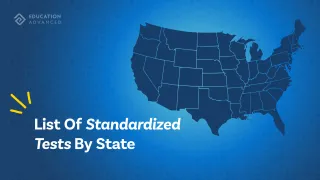List of Standardized Tests by State

Standardized tests vary based on state and have students solve the same set of questions and receive scores in a standard way to compare the relative performance. Standardized testing has become an important part of the educational system in the United States and is an important tool to help schools gauge how well students understand and apply their knowledge.
Below are some of the tests that apply to specific states as well as a general list.

Standardized Tests by State
Alabama
Administering agency: Alabama State Department of Education
- Students grades 3-8 take the Scantron Performance test in March.
- Grades 9-12 are required to take the ACT with an additional writing module during the 11th grade year.
Alaska
Administering agency: Alaska Department of Education and Early Development
- Grades 3-8 take the Performance Evaluation for Alaska's Schools (PEAKS) between March and April.
- Grades 9-12 take the PEAKS test yearly in March or April. Some districts also require the SATs.
Arizona
Administering agency: Arizona Department of Education
- Grades 3-8 take the AZMerit exam between April and May.
- Grades 9-12 also participate in the AZMerit exam, but may substitute with the ACT, SAT, or IB (International Baccalaureate).
Arkansas
Administering agency: Arkansas Department of Education
- Grades 3-8 take the ACT Aspire test between April and May.
- Grades 9-12 are also expected to take the ACT Aspire test between April and May, but have the option to take the ACT with an optional writing section.
California
Administering agency: California Department of Education
- Grades 3-12 administer the Smarter Balanced test between January and July.
Colorado
Administering agency: Colorado Department of Education
- Grades 3-8 participate in the Colorado Measures of Academic Success (CMAS) between March and April.
- Grades 9-12 are required to take an SAT suite of assessments..
Connecticut
Administering agency: Connecticut Department of Education
- Grades 3-8 take the Smarter Balanced test by subject between March and June.
- Grades 9-12 are required to take an SAT suite of assessments.
Delaware
Administering agency: Delaware Department of Education
- Grades 3-8 take the Smarter Balanced test by subject between March and May.
- Grades 9-12 are required to take an SAT suite of assessments.
District of Columbia
Administering agency: DC State Board of Education
- Grades 3-8 take the Partnership for Assessment of Readiness for College and Careers (PARCC) in the spring.
- Grades 9-12 take the Partnership for Assessment of Readiness for College and Careers (PARCC) in the spring. DC students are also eligible to take the SAT test for free in 11th or 12th grade.
Florida
Administering agency: Florida Department of Education
- Grades 3-8 take the Florida Standards Assessments (FSA) between April and May.
- Grades 9-12 take the Florida Standards Assessments (FSA) between April and May. They may also take the ACT or the SAT in place of the FSA if they achieve above a certain score.
- NOTE: Florida moving from Florida Standards Assessments (FSA) to Florida Assessment of Student Thinking (FAST) on July 1, 2022

Georgia
Administering agency: Georgia Department of Education
- Grades 3-8 take the Georgia Milestones Assessment in April.
- Grades 9-12 also take the Georgia Milestones Assessment in April although some districts also offer the SAT.
Hawaii
Administering agency: Hawaii Department of Education
- Grades 3-8 take the Smarter Balanced test in June.
- Grades 9-12 are required to take the ACT with Writing in 11th grade.
Idaho
Administering agency: Idaho State Department of Education
- Grades 3-8 take the Smarter Balanced test in the spring.
- Grades 9-12 also take the Smarter Balanced test in the spring, but Idaho also offers free PSATs to 10th graders and free SATs for 11th graders.
Illinois
Administering agency: Illinois State Board of Education
- Grades 3-8 take the Illinois Assessment of Readiness (IAR) test between March and May.
- Grades 9-12 are required to take the SAT in 11th grade.
Indiana
Administering agency: Indiana Department of Education
- Grades 3-8 take the ILEARN test between April and May.
- Grades 9-12 take the ISTEP+ test between April and May.
Iowa
Administering agency: Iowa Department of Education
- Grades 3-12 take the Iowa Statewide Assessment of Student Progress (ISASP) between March and May.
Kansas
Administering agency: Kansas Department of Education
- Grades 3-8 take the Kansas Assessment Program (KAP) between March and May.
- Grades 9-12 also take the Kansas Assessment Program (KAP) between March and May, with the ACT offered in February and March.
Kentucky
Administering agency: Kentucky Department of Education
- Grades 3-8 take the Kentucky Performance Rating for Educational Progress (K-PREP) between March and June.
- Grades 9-12 are required to take the ACT in 11th grade.
Louisiana
Administering agency: Louisiana Department of Education
- Grades 3-8 take the Louisiana Educational Assessment Program (LEAP) between April and May.
- Grades 9-12 are required to take the ACT in 11th grade.
Maine
Administering agency: Maine Department of Education
- Grades 3-8 take the Maine Educational Assessment (MEA) between March and June.
- Grades 9-12 are required to take the SAT in 11th grade.
Maryland
Administering agency: Maryland Department of Education
- Grades 3-8 take the Maryland Comprehensive Assessment Program (MCAP) in the spring.
- Grades 9-12 also take the Maryland Comprehensive Assessment Program (MCAP) in the spring. Some districts also offer the SAT to 11th graders.

Massachusetts
Administering agency: Massachusetts Department of Education
- Grades 3-12 take the Massachusetts Comprehensive Assessment System (MCAS) between May and June.
Michigan
Administering agency: Michigan Department of Education
- Grades 3-8 take the Michigan Student Test of Educational Progress (M-STEP) between April and May.
- Grades 9-12 are required to take the SAT in 11th grade.
Minnesota
Administering agency: Minnesota Department of Education
- Grades 3-12 take the Minnesota Comprehensive Assessments (MCA) between March and May.
Mississippi
Administering agency: Mississippi Department of Education
- Grades 3-8 take the Mississippi Academic Assessment Program (MAAP) between March and May.
- Grades 9-12 are required to take the ACT in 11th grade.
Missouri
Administering agency: Missouri Department of Education
- Grades 3-8 take the Missouri Assessment Program (MAP) between February and June.
- Grades 9-12 also take the Missouri Assessment Program (MAP) between February and June, although some districts offer the ACT or SAT for 11th
Montana
Administering agency: Montana Office of Public Instruction
- Grades 3-8 take the Smarter Balanced test between March and May.
- Grades 9-12 are required to take the ACT with Writing in 11th grade.
Nebraska
Administering agency: Nebraska Department of Education
- Grades 3-8 take the Nebraska Student-Centered Assessment System (NSCAS) between March and April.
- Grades 9-12 are required to take the ACT with Writing in 11th grade.
Nevada
Administering agency: Nevada Department of Education
- Grades 3-8 take the Smarter Balanced test between February and May.
- Grades 9-12 are required to take the ACT with Writing in 11th grade.
New Hampshire
Administering agency: New Hampshire Department of Education
- Grades 3-8 take the New Hampshire Statewide Assessment System (NHSAS) test between March and June.
- Grades 9-12 are required to take the SAT in 11th grade.
New Jersey
Administering agency: New Jersey Department of Education
- Grades 3-8 take the Partnership for Assessment of Readiness for College and Careers (PARCC) or the New Jersey Student Learning Assessments (NJSLA) between March and June.
- Grades 9-12 also take the Partnership for Assessment of Readiness for College and Careers (PARCC) between March and June, but can substitute ACT or SAT scores for exit exams.
New Mexico
Administering agency: New Mexico Public Education Department
- Grades 3-8 take the Partnership for Assessment of Readiness for College and Careers (PARCC) or the New Mexico Measures of Student Success and Achievement (NM-MSSA). The test takes place between March and May.
- Grades 9-12 also take the Partnership for Assessment of Readiness for College and Careers (PARCC) or the New Mexico Measures of Student Success and Achievement (NM-MSSA) in March and May, but some districts also offer the SAT to 11th graders.
New York
Administering agency: New York State Education Department
- Grades 3-8 take the New York State Assessments (NYSA) in April and May.
- Grades 9-12 take the Regents Examinations in the spring. Some districts also offer the SAT to 11th graders. While most New York students have to pass state exams in five subjects to graduate, the New York Performance Standards Consortium’s 38 schools have a state waiver that allows their students to earn a diploma by passing just one exam: comprehensive English.
North Carolina
Administering agency:North Carolina Department of Public Instruction
- Grades 3-8 take the North Carolina End-of-Grade Tests (EOG) in the final 30 days of the school year.
- Grades 9-12 are required to take the ACT with writing in 11th grade.
North Dakota
Administering agency: North Dakota Department of Public Instruction
- Grades 3-8 take the North Dakota State Assessment (NDSA) test between March and May.
- Grades 9-12 also take the North Dakota State Assessment (NDSA) test between March and May. Some districts may substitute the ACT for 11th graders.
Ohio
Administering agency: Ohio Department of Education
- Grades 3-8 take the Ohio Achievement Assessment (OAA) between March and May.
- Grades 9-12 take the Ohio’s State Tests in the spring, but can also substitute ACT or SAT scores for exit exams.
Oklahoma
Administering agency: Oklahoma Department of Education
- Grades 3-8 take the Oklahoma School Testing Program (OSTP) between April and May.
- Grades 9-12 are required to take the ACT or the SAT, depending on their school district.
Oregon
Administering agency: Oregon Department of Education
- Grades 3-8 take the Smarter Balanced test between January and June.
- Grades 9-12 also take the Smarter Balanced test between January and June although some districts offer the SAT to 11th graders.
Pennsylvania
Administering agency: Pennsylvania Department of Education
- Grades 3-8 take the Pennsylvania System of School Assessment (PSSA) in the spring.
- Grades 9-12 take the Keystone end-of-course tests in the spring.
Rhode Island
Administering agency: Rhode Island Department of Education
- Grades 3-8 take the Rhode Island Comprehensive Assessment System (RICAS) between March and May.
- Grades 9-12 are required to take the SAT in 11th grade.
South Carolina
- Grades 3-8 take the SCReady between April and June.
- Grades 9-12 take the Ready to Work test in the spring. Some districts also offer the ACT and SAT to 11th graders.
South Dakota
Administering agency: South Dakota Department of Education
- Grades 3-8 take the Smarter Balanced test between March and May.
- 9-12 grade students take the Smarter Balanced test between March and May.
Tennessee
Administering agency:Tennessee Department of Education
- Grades 3-8 take the Tennessee Comprehensive Assessment Program (TCAP) between April and May.
- Grades 9-12 take the TNReady test in the spring. Some districts also offer the ACT and SAT to 11th graders.
Texas
Administering agency: Texas Education Agency
- Grades 3-12 take the State of Texas Assessments of Academic Readiness (STAAR) between May and June.
Utah
Administering agency: Utah State Board of Education
- Grades 3-8 take the Readiness Improvement Success Empowerment (RISE) between March and May.
- Grades 9-12 are required to take the ACT with Writing in 11th grade.
Vermont
Administering agency: Vermont Agency of Education
- Grades 3-12 take the Smarter Balanced test between January and March.
Virginia
Administering agency: Virginia Department of Education
- Grades 3-8 take the Standards of Learning (SOL) test between March and April.
- Grades 9-12 take the Standards of Learning (SOL) exit exam or can substitute with the ACT, SAT, or IB (International Baccalaureate).
Washington
Administering agency: Washington State Board of Education
- Grades 3-8 take the Smarter Balanced test in the spring.
- Grades 9-12 also take the Smarter Balanced test in the spring or can substitute with the ACT, SAT, or IB (International Baccalaureate).
West Virginia
Administering agency: West Virginia Department of Education
- Grades 3-8 take the West Virginia General Summative Assessment (WVGSA) near the end of each school year.
- Grades 9-12 are required to take the SAT in 11th grade.
Wisconsin
Administering agency: Wisconsin Department of Public Instruction
- Grades 3-8 take the Wisconsin Forward test between March and May.
- Grades 9-12 are required to take the ACT with Writing in 11th grade.
Wyoming
Administering agency: Wyoming Department of Education
- Grades 3-8 take the Wyoming Test of Proficiency and Progress (WY-TOPP) between April and May.
- Grades 9-12 are required to take the ACT (Writing optional) in 11th grade.
In addition to these state-specific tests, there are other broader standardized tests as well:
Common Core State Testing
Common Core State testing is a standardized test that examines a student's language and math aptitude while concentrating on topics like Economics, Art, foreign languages and other language arts. An important factor for Common Core is the ability to transfer knowledge and skills from one situation to another with expectations for students to further transfer this knowledge outside the classroom.
TerraNova
Created by McGraw-Hill, TerraNova is a sequence of tests designed to assess K-12 students to determine student comprehension and problem-solving skills in Language Arts, Reading, Math, Social Studies, Science, Vocabulary, Spelling, and other domains. Furthermore, the Department of Defense, California, and several other states have implemented this standardized testing system into their curriculum.
Stanford Achievement Test
Usually known as the SAT 10, educational publisher Pearson developed this standardized test that tests mathematics, reading comprehension, language, problem-solving, spelling, listening comprehension, social science, and science.
STAR Tests
Developed by Renaissance Learning for use in K-12 education, these STAR tests are unique and make use of adaptive technology and computers as the testing medium. Teachers can use these standardized tests to assess early literacy, reading, or math students. They can be an essential tool in training students for state and high-stakes examinations and are often used to observe student improvement and make plans for student specific lesson diversity to improve student abilities rather than decide state or local schooling policy.
SBAC and PARCC Tests
SBAC (Smarter Balanced Assessment Consortium) and PARCC (the Partnership for Assessment of Readiness for College and Careers) are newer standardized tests completed on computers. Some questions in these tests demand research, problem-solving and writing aptitudes even when they come in multiple-choice format, particularly in the case of PARCC, which is an embodiment of the Common Core ideology.
High School Level Standardized Tests
AP Exams
There are presently 34 distinct Advanced Placement courses in which students can enroll to access college-level learning in everything from Art History to Calculus. Students who take AP tests and the following exams can gain university credit at a much-reduced price and potentially graduate early. Due to these benefits, these tests can be a significant priority to students who intend to take them. It should be noted that these tests are far more difficult than typical grade-level assessments and are graded on a 5-point scale rather than the traditional 4-point system.
International Baccalaureate Exam
While much more common in European countries and international schools, the IB (International Baccalaureate) exam still plays a vital part for students in IB schools in the United States. This standardized test can act as a substitute for the SAT (Scholastic Assessment Test) and even offer students university credit in languages and select other subjects.
SAT Subject Tests
While the SAT (Scholastic Assessment Test) offered by the College Board might not be essential for students to get admission to some universities, these tests allow students to showcase their accomplishments in distinct subject areas, like History, English, Science and Mathematics.
Graduate-level Standardized Tests
GRE
The Graduate Record Examination, popularly known as GRE, is an important test for admission to most graduate colleges and universities in the United States. They evaluate a student's understanding of quantitative aptitude, verbal reasoning, critical thinking, and analytical writing.
LSAT
Students planning to gain admission into any law school in the United States will initially need to appear for the LSAT (the Law School Admission Test). The test evaluates students on reading comprehension as well as logic and reasoning. Furthermore, this standardized test is an important part of the law school admissions process in the United States, Canada and Australia.
MCAT
MCAT is an important standardized test for students aspiring to become a doctor or enter the medical field in some capacity. This computer-based test assesses the capability of students to solve problems, think critically, and evaluate their scientific understanding and writing proficiency. Specialized careers in health care may need to appear for other tests like the PCAT (Pharmacy College Admission Test), DAT (Dental Admission Test), and the OAT (Optometry Admission Test).
Conclusion
There are many different standardized tests used across different states and grade levels. No matter what assessment your school gives to students, TestHound from Education Advanced allows schools to plan and coordinate all state and local K-12 school assessments while planning for all student accommodations, testing history, and more. This helps reduce human errors and testing irregularities across students and save time through an automated process.
More Great Content
We know you'll love





